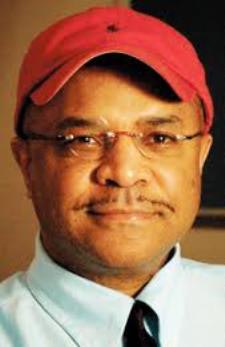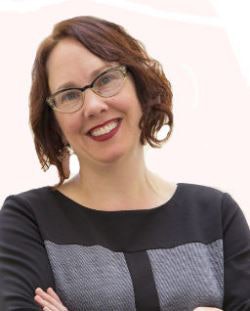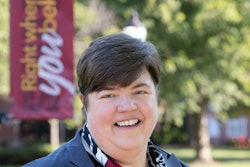What is known as crossover scholarship must be rethought as a generative scholarly engagement. Karlyn Crowley, professor of English at St. Norbert College, argued recently that the way that crossover scholarship is thought about as uni-directional is inaccurate. That is, it is not a one-way street from the academy to the public. Instead, the effective metaphor for crossover scholarship is “ecology,” where academic work cycles from public to academic to public and back again — full circle.
When one thinks about examples of “crossover ecology,” we feel that a good example would be some of the work of George Yancy, professor of Philosophy at Emory University. For example, what has become a well-known series on race for The Stone in the New York Times “features the writing of contemporary philosophers and other thinkers on issues both timely and timeless.”
 Dr. George Yancy
Dr. George YancyYancy’s interviews featured some of the most important philosophers and intellectuals of our time. The concluding entry for the 19 interviews he conducted was Yancy’s own piece, “Dear White America.” Interestingly, it was Yancy’s concluding article that went viral and national.
Going viral can sometimes mean going bad. The responses to “Dear White America” included threats and violence. Yet this article impacted thousands of people in terms of thinking more deeply about White supremacy and encouraged many to look at his important work on race and whiteness, and the work of those scholars, some of whom had not been interviewed before through such an important venue as The Stone. Thus, Yancy created a sort of archive of intellectual work on race that had implications beyond the White/Black binary. In turn, the responses of the public have created opportunities to continue to examine philosophy and race, thus its use as an example in this article.
Given our mutual investment in the concept of crossover ecology, we decided that it was important to come together and delineate important ways of conceiving of crossover scholarship as ecology. Thus, in this article, we will discuss the ways that crossover ecology affects four aspects of scholarship:
- Voice: It forces scholars to write with verve, clarity and purpose to communicate broadly.
- Impact: It can build a large audience that ultimately translates to cultural influence.
- Agency: It shortens the time from thought to publication; ideas do not languish.
- Quality: It fosters collaborative and communal thinking not in isolation and feeds scholarship rather than detracts from it.
We both began to critically engage the overall dimensions (positive or negative) regarding the concept of crossover ecology, especially when one looks closely at the etymology of the term “ecology.” It implies the sense of a relational dwelling place, a relational habitation, a movement away from the/a center. In stream with the etymology of the term ecology, we came to realize that the 19 interviews at The Stone very much fed other aspects of Yancy’s philosophical corpus, revealing important conceptual relational ties. And while the racist vitriol that he received was discouraging and even deeply saddening, the positive ecological fruits, as it were, outweighed the negative responses.
The interviews were designed to engage in a critical and insightful discussion about race within a larger public sphere, a dynamic relational space where readers got to dwell together. The interviews were not designed to exclude, but to include, to function as a gathering space of voices. While it is true that the academy is a relational space, it tends to be hermetic, a space where only certain credentialed individuals are allowed to participate. Academic credentialing, though, can also function as a process that excludes the non-credentialed, treating them as if they do not have anything of importance to add to the conversation. This can function as a form of epistemological violence where we violate their capacity to know.
As academics, we must fight against the tendency to privilege our specialized voices. Consistent with Crowley’s idea of crossover ecology, Yancy’s interviews had a broader impact than could have been achieved by writing an “academic” article. Within a specialized journal or “academic” book, a diverse readership can dwindle. The interviews functioned as ways of inviting readers within the critical and collective fold, a form of democratization of critical space and critical voices. Ecology implies a larger sense of appreciating the greater distribution of discourses and ideas across time, space, geography, and institutional sites. Thus, the interviews allowed Yancy a broader experimental space within which to engage his own ideas, which led to important feedback that was very helpful, where his ideas became shaped by many others. Such a dynamic process of dialogue even troubled the notion of “ownership” vis-à-vis ideas.
Of course, there is greater risk when one opens oneself up to a larger space of critical discussion. Many times, at least in this case, the feedback wasn’t critically engaging, but vile and filled with hatred and discursive violence. Yet, one mustn’t be deterred by this sort of vitriol. The expansion of voices, their coming to dwell near, to create a discursive dwelling place, an ever expanding discursive ecology, is greater than those voices that desire and attempt to silence. Such voices are anti-ecological, which, for us, means attempting to place under erasure a generative space for communicative habitation.
The four aspects of scholarship vis-à-vis crossover ecology delineated above—voice, impact, agency and quality—can be illustrated by way of Yancy’s The Stone: New York Times’ interviews on race. For example, take voice. Writing for The Stone necessitated that the voice chosen should be unhinged from a specialized discourse. In this kind of forum, one is forced to unmask oneself in important ways. In the academy, where we construct our voices according to certain academic norms that we often take to be sacrosanct, our voices tend to be rather sterile, conforming to explicit and implicit communication norms that are insular. One typically writes for those who mirror our academic selves, where academia is deemed the only real site where “true” learning takes place. So, in crossover ecology, there is a stylistic difference, one that is freeing when writing for a larger audience where there will be different voices, a multiplicity of voices, voices that are brilliant, but whose brilliance need not be restricted or defined within the walls of the academy with its truncating normative assumptions. So, writing for/to a larger audience where there is what we are calling crossover ecology provides for a context where one gets to improvise more, speak with greater intimacy, reveal the self to others (and have them reveal themselves to you) in ways that feel far more vibrant and less academically artificial and distant.
 Dr. Karlyn Crowley
Dr. Karlyn CrowleyAs for impact, that goes without saying. “Dear White America,” which is currently being expanded into a book, received more than 2,000 comments within a relatively short period of time and was the catalyst for the American Philosophical Association to release its statement against bullying. The article was also quickly commented upon as far away as Australia. And while there is that profoundly negative risk mentioned above and that personal sense of having to endure hatred, the impact of crossover ecology is incredible. That article reached across North America within hours and it was able to generate a space, for the most part, of democratically engaged forms of communication, where one begins to witness a citizenry that is passionate about ideas. What began to happen was a positive process of embodied voices coming closer within a discursive dwelling place.
So, impact is important as ideas are meant to make a difference and we would hope a positive difference. The interviews that were conducted for The Stone also received national and international positive attention. The project was profoundly unprecedented. After all, where in our country is race being critically engaged by scholars within a prominent newspaper like the New York Times? It was incredible. And though “Dear White America” was published on December 24, 2015, the piece sill generates email responses; some still very negative and others containing messages of sincere gratitude and insight.
As for agency, there is a different way in which agency gets mobilized in crossover ecology. So, the self that writes deals with a different dimension of temporality. There isn’t the long vetting process that precedes writing-to-publication or even thinking and then writing. This doesn’t mean that one’s “writerly” self is less responsible. The point here is that one writes with greater speed and one writes under different time constraints. This can actually lead to more creative ways of communicating, as ideas are fresh and one can write with levels of spontaneity. We think that with the written word (or the spoken word) we should always think before we write (or speak), but the writing-to-publication, within certain spaces, can be shorter. There is greater fluidity, flow of a “speakerly” self/voice. It might be argued that because of this shorter time period, one tries one’s best to be more precise.
It is important to note that the precision discussed above shouldn’t stifle creativity or quality. Again, in terms of how we are defining crossover ecology, we think that there is a feedback loop where the public and the academic interpenetrate. We have to keep in mind that the academy is also a social space, but it is narrow. It also conceives of itself as “private,” which helps it to buttress itself as beyond error, beyond the “horde” of those who are said to be “ignorant.” This view is deeply problematic, divisive, and hierarchical.
Producing pieces like the interviews on race or writing a stand-alone article can add to one’s voice, expanding that voice, and expanding the voices of those who one may not have heard from within the narrow confines of the academy. So, the quality of one’s work shifts. It could be argued that we tend to become sharper, because there are so many more diverse voices. Diversity has deep epistemological significance; it reveals to us just how limited and biased we can be. Diversity speaks to us from elsewhere, a place of difference. Because of a diversity of voices, we find that our work becomes more relevant and informed. So, there is a very specific and explicit recognition of the generative space of a social epistemology of knowing and knowledge production, where we recognize the interdependency of multiple voices and how they bring greater perspectives that, one might say, enlarges the truth. So, the ecological work that we do is implicative of forms of conversational pluralism that are indispensable to the project of creating new selves, better selves, more beautiful selves.
We have some cautionary tales, though, regarding the type of writing that reaches a broader audience, such as newspaper venues or other so-called non-academic forums. First, there are assumptions within the academy that impacted how you are pegged as “non-academic” if you do not follow the traditional lines of academic performance. Both of us are able to engage both traditionally academic spaces and non-academic spaces. By “non-academic,” we’re not relying on some fictional distinction between those who are “in the know” as opposed to those who are not. We believe that a different discourse is needed here. Let’s just talk about different discursive spaces, or communities of intelligibility. Our point is that some academics can suffer if a very narrow metric is used to measure their output. It is important for all of us to rethink what constitutes scholarship.
Second, there is great risk in engaging what we are calling crossover ecology. Because one’s voice will reach so many, one opens oneself to serious forms of potential and actual danger. This is not to say that there are not forms of danger within the classroom or within academic spaces. Those spaces can be very dehumanizing and demeaning, especially in our field of philosophy where racism and sexism continue to exist.
The point here is that when engaging outside of the academy, one can feel helpless, it seems to us, to modulate the degree of that hate speech. One can, as in the case of writing for The New York Times, receive threats of physical harm and be attacked by racist vitriol. After “Dear White America,” the experience was palpably painful for Yancy, being called the N-word and compared to a monkey too many times to remember. Police presence was needed during a couple of public lectures, and email messages were screened by campus police. Yet, there is something to be said about the social role of being an intellectual gadfly, of crossing over to a domain where folk have not been seduced by restrictive academic discourse. But both spaces are important at the end of the day. Our voices must resound in those spaces that are isolated (like the academy), spaces where our voices need to break those places down, allow for a different quality of thinking, valuing, loving, and being. Our voices must also resound in those broader social spaces that so many academics relegate to superficial chatter. Breaking down such artificial barriers is what crossover scholarship can and must do.
Finally, we think that a crossover ecology resonates with Paulo Freire’s critique of what he called a banking system of education in his book, Pedagogy of the Oppressed (1970). In that book, he critiques the dynamic between teacher and student where that relationship is unilateral, where teachers teach and where students listen. Within the broader context of scholarship, the ethos of the banking system positions the “experts” as those who speak and those who are “non-experts” are positioned as passive learners/listeners/readers. This relates to our earlier point about quality. Crossover ecology creates the important space for collaborative and communal thinking and praxis.
Freire, it seems, was able to create a generative space for thinking together, what might be called a “we-form” of critical engagement with Brazil’s co-called lower class or peasants. So, crossover ecology contests a certain intellectual narcissism and provides a space for everyday people to engage in critical reflection and create a polyphonic symphony of mutual learning, exchange, and self-determination. Of course, Freire conceived mutual non-hierarchical dialogue as an impetus for potential revolutionary action in the form of liberation. To make a paradigm shift to a crossover ecology model would also need to involve deep normative, epistemological, and institutional changes. It would require that we rethink what it means to learn, to think, to engage scholarship, how we think about collective genius, etc. We’ve been seduced into thinking that the way things are can’t be changed. Crossover ecology has embedded within it the assumption that our practices and institutions are contingent, mutable. This contingency and mutability are at the heart of generative change, mutual impact, dwelling together within spaces where we openly admit to our narrowness and risk being transformed by others for the better. It isn’t easy, but it is doable.
We are/were both inspired by the work done at The Stone; it is a fecund site for generating collaborative and communal thinking. The site generates, at its best, a conversational space, a relational dwelling space. In that sense, The Stone takes its readers seriously and respects their capacity for generating productive thought/thinking. Of course, there are always some readers and writers who would rather dominate the conversation. This, of course, is contrary to how we understand part of what is meant by crossover ecology. However, The Stone does provide that dynamic where academic work cycles from public to academic to public and back again full circle. That communicative dynamic constitutes a rich mutual relationship of influence, one that is synergetic and democratizes how we understand scholarship. We think that all academics can benefit from crossover scholarship in terms of the metaphor of ecology. The process dares scholars to confront their finitude and to engage a world that is more like a dynamic interacting web than a linear hierarchy.















